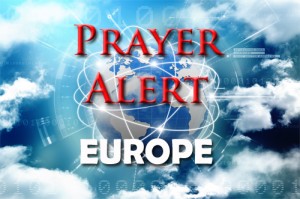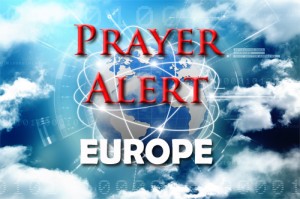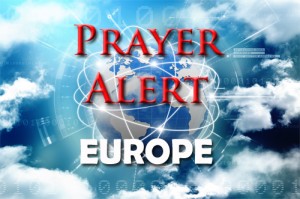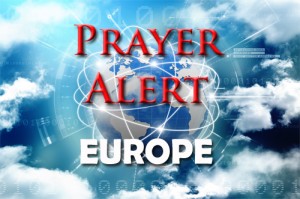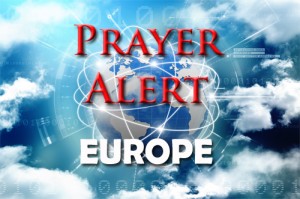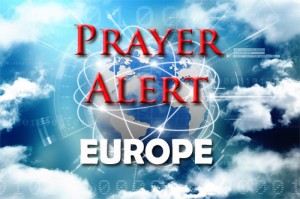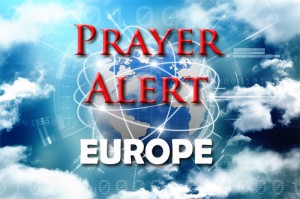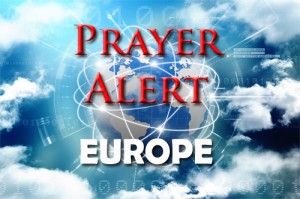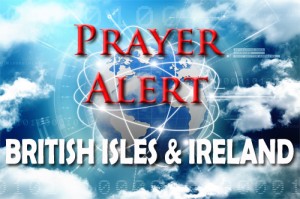Displaying items by tag: Europe
Germany - CALL OF THE WATCHMEN
Send forth Your light and Your truth!
How often have we proclaimed this word of the Lord over our land – and that God has answered! At the German Prayer Conference in Berlin, from September 1 to 3 , weexperienced the revelation of God’s light and truth in aspecial way! This helped us to recognise the influence of thespirit of the age on our thinking and to be released from it.
True repentance begins with a change in our thoughts(“metanoia” in Greek). The word of God is our guide andhelp: “We demolish arguments and every pretension thatsets itself up against the knowledge of God, and we takecaptive every thought to make it obedient to Christ.”(2 Corinthians 10:5).
Pray: Let us continue to pray in faith for our land: “Send forth your light and your truth, let them guideme, let them bring me to your holy mountain, to the place where you dwell.” (Psalm 43:3). -RS
Universities and centres of further education
In the coming months after the prayer conference we wantto concentrate on how we can make a change in our way ofthinking in our society. The Holy Spirit wants to bring abouttransformation in our society and culture. God wants topermeate our education system to break the power ofungodly ideologies and thought structures. Our thinking isalways subject to the influence of the “spirit of the age”.
Knowledge is never neutral and unbiased, but formedaccording to prevailing and generally accepted beliefs.Nowhere are the thoughts and actions within eachgeneration so strongly moulded and influenced as withinour universities and other centres of further education.
Many of the 2.8 million students today will one day be ourleaders and will in many ways influence all areas of sociallife: justice, business, philosophy, education, theology,literature and politics. For too long the thinking of the ’68movement has been influencing all of these areas. The Spiritof God wants to permeate the centres of thoughtformationin our land once again. In past centuries God has inspiredmany in our universities to take his kingdom into the world.
God is the source of ideas and solutions to all questions inlife. He has all the help and answers that our land sourgently needs. But we also need creative thinkers with aservant’s heart who together with the Holy Spirit candevelop innovative ideas and influence thought withinGermany for the good of our land. God is the one who givespeople the gifts, talents and grace to be a blessing to theworld. Germany has often been known as the “land of poetsand thinkers” and is very open to new ways and ideas.
May the Holy Spirit come into our universities and centresof education to renew our way of thinking and bring forthnew life in our land.
Pray:For a transformation in the ways of thinking in oursociety in a move to draw us closer to God.(2 Corinthians 10:4-5)
Pray: For a movement of the Holy Spirit in our universitiesand other centres of thought formation. (Acts 4:29-31)
Pray: That creative thinkers will be inspired by the Holy Spiritto find answers and solutions for the needs of our land.(Daniel 1:7,20; Proverbs 3:5-6)-AS
Formation of a new federal government
The German Federal Parliament was elected four years agoon September 22 , 2013, but the election of the federalchancellor did not take place until December 19 , 2013.There is no deadline for this election in the Germanconstitution. Protracted considerations as to which partiesshould form a coalition and the difficulties in thenegotiations towards a coalition agreement delayed theformation of a new government. This can definitely happenagain if one believes the opinion polls. As this prayer letterwas being written, the result of the new elections onSeptember 24 was not yet known. Angela Merkel recentlystated regarding the election: “Until Sunday evening I canstill do something, then I am constrained to remain passive
Afterwards we just have to wait and see. It is like waiting for your school report card.” But what happens next? Many questions must be answered in Berlin: which parties areable to form a coalition? What positions (ministers, state secretaries...) does each party get? Who are standing for these positions, which political wings within the parties will be involved, which federal state interests must be considered? How many women should be included? Who will be vice-chancellor? All these decisions will determinethe direction of our country for the next four years.
Pray:That God lifts up and brings down people during theprocess of forming a coalition and the new Germanfederal government. (Luke 1:51-52)
Pray: That trustworthy, visionary and God-fearingparliamentarians will fill the important positions ingovernment (in the foreign ministry, for example).(Proverbs 8:15-17)
Pray: For the coalition agreement; that the needs of ourpeople and the role of our country with regard toEurope, Israel and the world will be Spirit-led andguide us into the future to the praise of God’s Name.(Romans 15:8-12) -JB
Family-related policies
Family-related policies in Germany have been subject tofundamental changes for some years as the meaning and role of marriage, family and parenthood have beenredefined without regard to traditional Biblical values.
Marriage has lost its exclusive status as a covenant betweena man and a woman by the introduction of “marriage forall”. The term “family” has already for a long time not beenregarded as exclusively reserved for “a father, a mother andtheir child(ren)” in accordance with God’s order in creation.
Parenthood was also redefined by the decision of theconstitutional court (2013) to the effect that legalparenthood and fatherhood can also exist without abiological or traditional family relationship to the child. Atthe same time the state took over more and more duties toeducate and raise children disregarding traditional familyresponsibilities.
Under new buzz-words and catch phrases such as “marriageand career compatibility”, “partnership-life” (replacing“family-life”), “well-being and equal-opportunities forchildren”, etc., the number of children under 3 years of agein some form of state care country-wide rose from 14% in2006 to 33% in 2015, and the number of mothers of 2 to 3year olds in a gainful occupation rose from 42% to 58% inthe same period. The place of the family in the traditionalBiblical sense as the very original core element of oursociety has in the past years been eroded step by step anddeprived of any significance. Let us pray that we will see amajor change in family-oriented policies as the next federalgovernment in Germany is built, with completely newappointments in the ministry for families, women, seniorsand young people!
Pray:For God-fearing personnel to be appointed in the newministry for families. (Psalm 111:10)
Pray: For a complete turn-around in the family-related policies in our land. (2 Chronicles 7:14)
Pray: That for the sake of their children mothers will not want to work and will receive support from the state. (Psalm 127:3)-TF
Anew reformation
The ten year programme of events within the Lutheran Church which started in September 2008 (“Luther-Dekade”in German) and the final year of commemoration of theReformation come to an end on October 31 , 2017.
Countless events, exhibitions and writings will have beendedicated to this anniversary, half of the city of Wittenbergrenovated, and Luther will have been disputed, pulledapart, held in somewhat high esteem and celebrated. Bythe end the numbers of visitors at church conferences andworld exhibitions will remain well under expectations andthe positive outcome that was anxiously awaited will feelmore like a depressive hangover. What will remain from theanniversary of the Reformation?
As the official activity in the past years comes to an end, thefaith for a new reformation has grown. Under the title “NewReformation” thousands of young Christians met in June inPrague and prayed in expectation for a reformation thatdoes not divide us but rather unites us in Jesus Christ andbrings millions back to Him. We believe that we stand onthe threshold of a new reformation that will once againbind the church to the Word of God, as first happened 500years ago, and from there bring a change in our society andthroughout Europe. And that the cloud of witnesses fromthe reformers and generations before us will stand with usbefore the throne of God and pray that the spiritualinheritance of the church in Germany will now be restored.
Pray: That on this 500 anniversary the doors will be openedfor a new reformation in Germany. (Psalm 24)
Pray: Lord, take back the lordship over your church of the Reformation! (Matthew 16:16-19)
Pray: For visible unity between the churches, for healing and reconciliation. (John 17:20-23) -KH
The German-Israeli Parliamentary Group
The basic function of parliamentary groups in the GermanFederal Parliament is to maintain mutual contacts withother national parliaments in the world. In the newlegislature period, the German-Israeli Parliamentary Group,as all the groups, will be rebuilt from the newly electedmembers of parliament. In the last legislature period therewere about 50 members in the group, representing allparties within the parliament. Membership is voluntary andthe parliamentarians are united by their interest in Israel.
They deal with general aspects of German-Israeli relations,work to provide clarification on Israeli issues to parliamentand the media, and are important contacts for the Jewishcommunity in Germany. As a counterpart in the IsraeliKnesset there is an Israeli-German Friendship Group ofIsraeli parliamentarians.
The work of the German-Israeli Parliamentary Group hasparticularly caught the attention of the general public, notleast because of the dedication of the chairman Volker Beckof the Greens Party, who will no longer sit in the newGerman parliament. Let us now pray for a Spirit-ledcomposition of parliamentarians in the next German-IsraeliParliamentary Group.
Pray:Thanks for the friendly connections between theGerman and Israeli parliaments. (Psalm 133:1)
Pray: That the Spirit of God will call dedicated people intothis German-Israeli Parliamentary Group and that theywill be a true voice for German-Israeli friendship.
Pray: For the new chairman to be influential and dedicated. (Psalm 119:30) -RS
Keep praying: Relationship between Germany and Turkey
The relationship between Germany and Turkey gets worse day by day. Increasingly German citizens are findingthemselves under interrogation, arrest and detention. Thearbitrary arrests have led to travel warnings. The Germangovernment now takes the position in the European Union that it would be right and proper to break off membershipnegotiations with Turkey. This however must be a majoritydecision. At this time there is no majority. The negativeinfluence of the Turkish Islamic Institute for Religion whichis controlled from Turkey comes more and more into thepicture. See also: “The Turkish Islamic Institute for Religion (Ditib)” in the prayer letter from November 2016.
Pray:For the re-evaluation of the relationship betweenGermany and Turkey in accordance with God’s plans and purposes. (Proverbs 2:6) -RS
Dates for your diary
01.10 International Day of Prayer for the Peace ofJerusalem (Robert Stearns - Eagles Wings).
31.10 Reformation Day in Germany.
God’s blessings from Rosemarie Stresemann and Team
Germany: influence of AfD
Alternative for Germany (AfD), founded in 2013, is a right-wing populist and Eurosceptic political party. In 2016 it made an alliance with the Freedom Party of Austria, with both party leaders saying border control officers should use armed force if necessary to protect the border. By May 2017, the AfD had gained representation in 13 of the 16 German state parliaments. Now it has become the third largest party in the German parliament, partly because immigration was the main election issue. Postwar Germany is multicultural, tolerant and liberal: abhorring war, and defending the environment, human rights and international teamwork. BUT the influx of over one million Muslim migrants, Russia’s dramatic resurgence, and Europe’s rolling financial problems are arousing other feelings and aspirations. These emotions don’t square with the desire to be tolerant and multicultural. Many are saying that a more powerful, more assertive, more terrifying Germany is coming.
German election, Brexit and Ireland
The German elections have weakened Chancellor Merkel’s leadership authority. Weeks of Brexit talks will be lost while Germany forms a government that can command a majority in its parliament. In the UK there are disagreements between Westminster and the leaders of the devolved parliaments/assemblies over which powers should eventually be ‘taken back’ from Brussels and the continuing failure to reach a Northern Ireland border agreement. Much more could be written, but the key thing for us all is to keep praying for those involved in the Brexit negotiations. May they make agreements that will speedily remove the fear and uncertainty faced by UK citizens in Europe and EU citizens in the UK, and bring clarity to businesses employing thousands who need to plan ahead for the next twelve months and beyond.
Crimea: human rights crimes
The UN has accused Russia of committing grave human rights violations in Crimea. There is a need for accountability. Russia annexed the peninsula from Ukraine in 2014, after that country's leader was overthrown. The UN report has documented random arrests, detentions, disappearances, torture, and at least one execution. There have been ‘intrusive law enforcement raids of private properties’, and the human rights situation has ‘significantly deteriorated’, with hundreds of prisoners illegally transferred from Crimea to Russian jails. Civil servants have been forced to renounce their Ukrainian citizenship or face losing their jobs, and Moscow has replaced Ukrainian laws with Russian ones. Education in Ukrainian has all but disappeared from Crimean schools. There was no immediate response from Russia to the report's accusations.
EU: Macron demands EU treaty changes
In what will be seen as a kick in the teeth to Jean-Claude Juncker, the European Commission president, Emmanuel Macron insisted that the EU should set goals for the next ten years and enforce treaty changes, or risk other member states following Brexit. The French president urged ‘new ambition’, or the Brussels bloc would face the ‘dismantling of Europe’. His comments followed Mr Juncker’s state of the union speech, which included his master plan for greater integration without treaty change. Speaking in New York, Mr Macron warned of difficult months and years ahead for the bloc if it could not shake off its image of overbearing bureaucracy; he said that other countries which are not comfortable with this will leave. Juncker had called for EU integration in the face of rising populism and elections in Italy, Sweden, Hungary, and the Czech Republic, where Eurosceptic parties are gaining momentum.
EU: Theresa May’s Brexit speech
On 21 September, the day before Theresa May delivers her first major Brexit speech in Florence, she met with her Cabinet to discuss her terms for Brexit. The last time she addressed the EU was in January, at Lancaster House, when she set out her original vision for Britain outside the EU. Now, with negotiations deadlocked over the ‘Brexit bill’ and the role of the EU courts, Europe is looking for a major policy intervention. Boris Johnson says the media is talking 'nonsense' about MPs having split allegiances while he and Philip Hammond, at opposite ends of the soft/hard Brexit debate, attempt to present a choreographed show of unity. However, some believe Friday's speech will not generate 'an immediate breakthrough' in Brexit talks.
Germany: election on 24 September
Angela Merkel has been chancellor since 2005. Her Lutheran faith (she calls it an inner compass) expresses itself in her unflashy style and her instincts - debt is bad; helping the needy, good. She thinks ethically, not ideologically. ‘I’m a bit liberal, a bit Christian-social, a bit conservative’, she said in 2009. Her years in office have made her a familiar figure to Germans and to the world. However, Germany needs reform. The lowest-paid 40% of German workers are earning less than 20 years ago. Foodbank use is up. The rate of investment has been dropping since 2012. Bridges creak and potholed roads challenge even the best-engineered suspensions. The economically crucial car industry has been tainted, as has the country’s air, by emissions from the diesel engines it favours (a scandal it tried to cover up). Dirty coal is filling gaps left by closing nuclear plants, and the country’s carbon-dioxide emissions are up.
Spain: refugees embrace Christianity at dramatic rate
Pablo leads a small indigenous ministry. He says Syrian refugees are frustrated with Islam, and when we begin to show the love of God in our actions and tell them about God in the Bible, they say they had never heard anything like it. When they start coming to church one of the brothers begins visiting them in their apartment, and explains that, as Christians, they are expressing God's compassion and kindness. The refugees become Christian. Every six months the EU sends 150 refugee families to this ministry for assistance to get resettled. Every month its human and financial resources are stretched. But they do whatever God tells them to do.
France: Macron v unions
French unions are famously radical and resistant to reforms. On 12 September rail workers, students and civil servants protested in cities from Paris to Toulouse against loosening labour regulations, seen as a key public test of the president’s reformist resolve. Police said there were 24,000 protesters in Paris; stone-throwing activists clashed with police, who responded with tear gas. Four thousand strikes were called around France by the country's biggest public sector trade union, the CGT. The numbers were, however, well below protests against another labour reform last year.
Brexit: God’s strategy
The following declaration is from Passion for the Nation: ‘We declare over our Parliament, over the EU and over all those involved in Brexit negotiations, that the Lord God is the Master Planner of heaven and earth. His plans are for good and not for evil, greater than every plan of man or the enemy to bring confusion, division or hopelessness. We come into agreement with His word, He is “the God who gives life to the dead and calls into being that which does not exist”. We stand as Your Ecclesia, and in the Name of Jesus we call forth the strategies of heaven over all matters concerning Brexit. We declare they will be seen, heard, endorsed and enacted by those called to policy-making at this time’.

